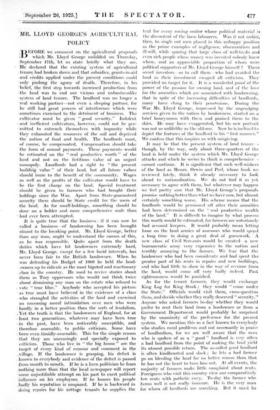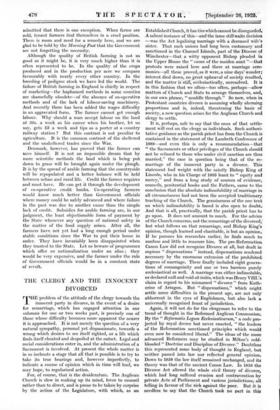:MR. LLOYD GEORGE'S - AGRICULTURAL POLICY
IBEFORE we comment on the agricultural proposals which Mr.. Lloyd George unfolded on Thursday, September 17th, let us state briefly what they are. - He declared that the existing system of agricultural tenure, had broken down and that subsidies, grants-in-aid • and credits applied under the present conditions could only prolong the. agony of death.. Therefore, in his ' belief, the first step towards increased production from • ,the land was to end our vicious. and unbusinesslike • systeth of land tenure. The landlord was no longer a real working partner—not even a sleeping partner, for he still had great powers of interference which were - sometimes exercised to the detriment of business. The cultivator must be given " good security." Indolent -*and inefficient cultivators, however, could not be per- - mitted to entrench themselves with impunity while they exhausted the resources of the soil and deprived the nation of food and health. The landlords must, of course, be compensated. Compensation should take the form of annual payments. These payments would be estimated on the " real productive worth " of the land and not on the fictitious value of an unjust monopoly. Landlords had a right to " the present building value " of their land, but all future values . should finite to the benefit of the' community. Wages . as well as the profits of the cultivator would have to • be the 'first charge on the land. Special treatment should be given to farmers who had bought their ' holdings since the War. Apart from State-guaranteed security there should be State credit for the users of . the land; -As for small-holdings, something should be •• done on a bolder and more comprehensive scale than had ever been attempted.
It is quite true that the business—if it can now be called a business—of landowning has been brought . almost to the breaking point. Mr. Lloyd George, better than any man, ought to understand the causes of this, • as he was responsible. • Quite apart from the death duties which have hit landowners extremely hard, Mr. Lloyd George, except for a few lucid intervals, has never been fair to the British landowner. When he • was defending his Budget of 1909 he held the land- - owners up to ridicule as the most bigoted and reactionary class in the country. He used to revive stories about them as Tory oppressors who would not think twice - about dismissing any man on the estate who refused to vote true blue." Anybody who accepted his picture - as true must have believed in the existence of a class _ who strangled the activities of the land and exercised an unceasing moral intimidation over men who were hardly in a better position than the serfs of feudalism. . Yet the truth is that the landowners of England, for at - least two generations, whatever :.inay have been true : in the past, have been noticeably susceptible, and therefore amenable,. to public criticism... Some have been even timidlnemenable. This for the simple reason :that they are unceasingly and specially exposed to criticism. Those who live. in " the big house " are the . target of every kind of rumour and comment in the „village. If the landowner is grasping, his defect is known to everybody and evidence of the defect is passed from mouth to .niouth. If he is a keen politician he fears :rnothing more than 'that the_ localnewspaper will report -some unjustifiable attempt on his part to exert political linfluence on his einployees. If he houses his people lbadly his reputation is. unspared. If he is backward in ;doing repairs for" his cottage tenants he supplies the text for every roving orator whose political material is the discontent of the farm labourers. Was it not unfair, then, to single out men placed in this unhappy position as the prime examples of negligence, obscurantism and ill-will, while sparing that large class of well-th-do and even rich people whose money was invested nobody knew where, and an appreciable proportion of whom were political supporters of Mr. Lloyd George himself ? These secret investors—so to call them—who had avoided the land as their investment escaped all criticism. They prOvided no target for it. It is a wonderful proof of the power of the passion for owning land, and of the love for the amenities which are associated with landowning, that in spite of the increasing difficulties of landlords, many have clung to their possessions. During the War Mr. Lloyd George, impressed by the ungrudging services given to the nation by landowners, started on a brief honeymoon with them and praised them to the skies. He may have exaggerated, but his new portrait was not so unlifelike as the old one. Now he is inclined to depict the features of the landlord in his " first manner." We confess that this inspires us with misgiving.
It may be that the present system of land tenure — though, by the way, only about three-quarters of the land is held under the system which Mr. Lloyd George attacks and which he seems. to think is comprehensive cannot continue. It is significant that such well-wishers of the land as Messrs. Orwin and Peel, whose book we reviewed lately, think it already necessary to look ahead to nationalization. We do not find it as yet necessary to agree with them, but whatever may happen we feel pretty sure that Mr. Lloyd George's proposals promise nothing better than what we have now, but almost certainly something worse. His scheme means that the landlords would be pensioned off after their annuities had been determined on the " real productive wealth of the land." It is difficult to imagine by what process this worth would be estimated, for farmers are notoriously bad account keepers. It would probably mean letting loose on the land armies of assessors who would spend a long time in doing a great deal of guesswork. A new class of Civil Servants would be created--a new bureaucratic army very expensive to the nation and terribly annoying to the farmer. We fear that the landowner who had been considerate and had spent the greater part of his rents in repairs and new buildings, and who had little to show in the way of revenue from the land, would conic off very badly indeed. Past righteousness would be, punished.
As for the tenant farmers, they would exchange King Log for King Stork ; they would " come under the State." Officials would visit them, cross-question them, and decide whether they really deserved " security." Anyone who asked farmers to-day whether they would prefer to rent their land from a landowner or from a Government Department would probably be surprised by the unanimity of the preference for the present system. We mention this as a fact known to everybody who studies rural problems and not necessarily in praise of landlordism, for we are well aware that the man who is spoken of as a " good " landlord is very often a bad landlord from the point of making the land yield -its utmost possible return. The so-called good landlord is often kindhearted and slack ; he lets a bad farmer go on bleeding the land for no better reason than that he has not the heart to turn him out. At all events, the majority of farmers make little complaint about rents. Foreigners who visit this country view our comparatttely : low rents with pathetic envy. To-day the farmer who farms well is not really insecure. He is the very man for whom all landlords are searching. But it must be admitted that there is one exception. When farms are sold, tenant farmers find themselves in a cruel position. There is room and need for a remedy here, and we are glad to be told by the Morning Post that the Government are not forgetting the necessity.
Although the quality of British farming is not so good as it might be, it is very much higher than it is often represented to be. In the quality of the crops produced and in the production per acre we compare favourably with nearly every other country. In the breeding of pedigree stock we have led the world. The failure of British farming in England is chiefly in respect of marketing—the haphazard methods in some counties are shamefully obsolete—of the absence of co-operative methods and of the lack of labour-saving machinery. And recently there has been added the wages difficulty in an aggravated form. The farmer cannot get enough labour. Why should a man accept labour on the land at 80s. a week as his career when his brother, let us say, gets £8 a week and tips as a porter at a country railway station ? But this contrast is not peculiar to agriculture. It is the common contrast of the sheltered and the unsheltered trades since the War.
Denmark, however, has proved that the farmer can save himself. It is not an impossible dream that by more scientific methods the land which is being put down to grass will be brought again under the plough. It is by the spread of arable farming that the countryside will be repopulated and a better balance will be held between urban and rural life. Credit the farmer requires and must have. He can get it through the development of co-operative credit banks. Co-operating farmers would know much better than Government officials where money could be safely advanced and where failure in the past was due to another cause than the simple lack of credit. Subsidies for arable farming are, in our judgment, the least objectionable form of payment by the State whenever any question of national safety in the matter of the food supply arises. After all, the farmers have not yet had a long enough period under stable conditions since the War to put their house in order. They have invariably been disappointed when they trusted to the State. Let us beware of programmes which offer us nationalization under an alias ; they would be very expensive, and the farmer under the rule of Government officials would be in a constant state of revolt.



















































 Previous page
Previous page